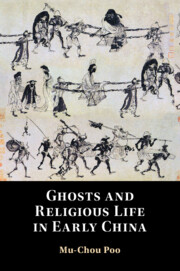Book contents
- Ghosts and Religious Life in Early China
- Ghosts and Religious Life in Early China
- Copyright page
- Contents
- Preface
- 1 Ghosts
- 2 The Emergence of Ghosts in Early China
- 3 Imperial Order and Local Variations
- 4 Stories That Reveal the Dark Corner
- 5 Ghosts in Early Daoist Culture
- 6 The Taming of Ghosts in Early Chinese Buddhism
- 7 Chinese Ghosts in Comparative Perspective
- Bibliography
- Index
2 - The Emergence of Ghosts in Early China
Published online by Cambridge University Press: 13 January 2022
- Ghosts and Religious Life in Early China
- Ghosts and Religious Life in Early China
- Copyright page
- Contents
- Preface
- 1 Ghosts
- 2 The Emergence of Ghosts in Early China
- 3 Imperial Order and Local Variations
- 4 Stories That Reveal the Dark Corner
- 5 Ghosts in Early Daoist Culture
- 6 The Taming of Ghosts in Early Chinese Buddhism
- 7 Chinese Ghosts in Comparative Perspective
- Bibliography
- Index
Summary
This passage is from the Book of Rites (Liji 禮記), a collection of Confucian teachings and anecdotes probably collected and redacted during the third century BCE.4 It is difficult to know to what extent the followers of the Confucian teaching would subscribe to this view, yet by virtue of its being recorded in the prestigious canon and regarded as the saying of Confucius, this passage tends to leave the impression that Confucius (or his disciples) regarded ghosts and spirits as invisible beings. In the Confucian Analects (Lunyu 論語), Confucius once said that one should “revere the ghosts and spirits but keep a distance from them.”5 The rationale of this statement seems to be that, as a humanist, Confucius encourages his students to pay more attention to the affairs of living people based on secular principles, rather than following the instructions of ghosts and spirits as propagated through those religious personnel such as shamans. However, this statement, as well as the Book of Rites passage quoted above, makes it clear that Confucius did not deny the power and efficacy of ghosts and spirits. We should also recognize that Confucius and his followers constituted only an extremely small group of intellectuals in their contemporary society. The majority of the people in pre-imperial China, from the tenth century to the third century BCE, would probably have had some idea of how a ghost should look like, though they might not have agreed with each other. To trace the origin and development of the concept of ghosts, however, it is necessary that we go back to the earliest documents.
- Type
- Chapter
- Information
- Ghosts and Religious Life in Early China , pp. 21 - 56Publisher: Cambridge University PressPrint publication year: 2022



